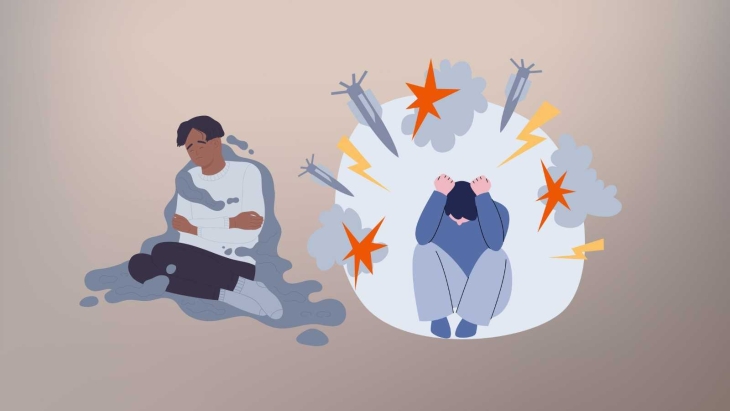Recent Posts
- Am I too sensitive to noise? It drives me crazy! The psychological effects of noise on mental health
- What are the signs that I am avoiding grief? How avoiding processing loss impacts mental health
- My son's disruptive behavior is affecting his life. How can I help him improve?
- I want to be ready for motherhood: Exploring pre- and postnatal mental health issues
- Effects of positivity on job search motivation. How do I stay confident when my job search gets tough?
Most Popular
My friend got diagnosed with Post-traumatic stress disorder (PTSD)! How can I be of help?

Any traumatic event, like an accident, violence, assault, abuse, military combat and more, bring in high levels of stress.
Statistics show that around 1 in 3 people experience these highly traumatic experiences in their lifetime.
In the past, the term PTSD or post-traumatic stress disorder was only used in cases where military combat produces symptoms of trauma to one involved. But then, PTSD is now being used as an umbrella term for any situation that causes trauma.
For example, PTSD is commonly seen in:
- People who were victims of crime involving physical and sexual abuse and assault, bombings, etc),
- People who deliver emergency care services,
- People who were victims of terrorism and war,
- People who were diagnosed with serious illness,
- And women after difficult childbirth.
Identifying a loved one’s experience and understanding that this traumatic moment in their life may be the reason why they are having mental health issues are crucial in supporting them.
When your loved one shows symptoms of PTSD, it is both difficult and overwhelming, especially if you desire to see them better.
Symptoms of PTSD
- Having difficulty sleeping
- Dependence to drugs and/or alcohol
- Remembering the experience through flashbacks and bad dreams
- Headaches, chest pains
- Avoidance of social interactions
- Avoidance of any situation that deals with their emotions such as anxiety, anger, and grief.
Because these symptoms recur and become intense, a person with PTSD may have highly stressful moments where they go through the physical and emotional effects of the trauma again and again.
Being around a loved one experiencing PTSD will also be challenging, so learn about healthy ways you can show support.
- Know that you are not the solution who can “fix” the problem. Instead be aware of how the situation makes you feel. Do you feel frustrated or angry that your friend is having a difficult time and may be hurting themselves or the people around them? Deal with your feelings, and take care of yourself first, so that you can be a supportive friend when your friend needs you.
- Learn as much as you can about PTSD and understand how PTSD is treated. Your good knowledge will help you understand your friend, and will guide you on how to offer help.
For example, part of reliving the trauma that people with PTSD experience is feeling angry, and not being able to focus and respond well. Not knowing this, you might judge your friend or feel afraid. But because you are aware of PTSD symptoms, you can think quickly, find a safe space, and ask for help if you think that the situation has become dangerous.
- Encourage your friend with PTSD to maintain a social group and get treatment. A couple of the symptoms of PTSD is avoidance of social interactions and avoidance of any situation that deals with their emotions such as anxiety, anger, and grief. When you notice your friend withdrawing from joining group activities or not wanting to spend time with others, encourage them to maintain a support group or a loving community.
This also includes getting help from health professionals. Once your friend is open to the topic of treatment, help them find mental health professionals and treatment providers and PTSD treatment programs that can benefit them.
Stress from trauma takes time, and people with PTSD need to learn healthy coping skills in order to start their recovery. But it takes time and a process. And being there for your friend all throughout this journey and supporting them matter!
Looking for a simple and easy way to connect with health care career opportunities all over the US? Gotham Enterprises Ltd’s comprehensive job posts can help you!








Comments